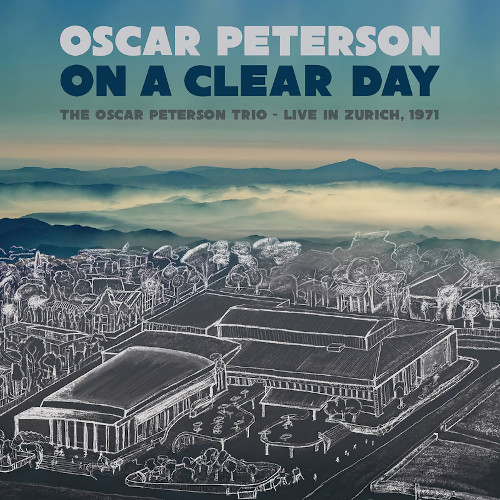
Imagine that you’ve earned world-wide respect and applause as the foremost jazz piano virtuoso of your time. And then you suffer a stroke which affects your left side and, almost fatally for your career, your left hand. Do you quit?
Not if you’re Oscar Peterson who was both literally and metaphorically, a giant. Roughly a year after the 1993 stroke, having conquered dark depression and despondency (Kelly Peterson, his daughter, comments: “…he needed to play just as much as he needed air to breathe”) Peterson was criss-crossing Europe with a stellar quartet comprising guitarist Lorne Lofsky, bassist Niels-Henning Ørsted Pedersen (NHØP) and the under-rated British drummer Martin Drew.
Personal note: we were fortunate to hear the group live at the 1994 Marciac Jazz Festival in South-West France and were astonished that Peterson, even with only one hand fully operational, was still able to perform at his astonishing level, elevating an eager French audience to ecstasy (even if they persisted in clapping annoyingly on the beat). But, it seemed to us, the occasionally mechanical Oscartronic dimension sometimes evident in his performances had faded and been replaced by a new sensitivity.
This album, ‘City Lights’, recorded live in Munich, Germany on 13 July 1994 on the same European tour, affirms our view. Martin Drew opens Warren and Gordon’s There Will Never Be Another You on brushes, NHØP picks up the beat, then Lofsky strums a few chords before the roof of the Münchner Philharmonie nearly levitates as the audience salutes Peterson’s delayed entrance. Theme stated, Lofsky solos and then Peterson unleashes a torrent of brilliantly executed ideas. Stroke? What stroke? Oscar Peterson Mk II had rediscovered his mojo.
The new sensitivity surfaces in Peterson’s original The Gentle Waltz, shot through with delicate overtones of wistfulness and nostalgia, anchored by NHØP’s miraculous bass playing. Lofsky, latest in a line of distinguished guitarists at Peterson’s side, delivers a beautifully considered solo. Kelly’s Blues named after his daughter (who also produced this album) is a catchy riff and the quartet delights the Munich crowd with a funky groove while Peterson, Lofsky and NHØP drive full pelt into the blues.
Love Ballade is a slow, romantic Peterson original garlanded with rich swags of decoration, ever dependent on NHØP’s stalwart support plus a thoughtful solo from Lofsky. City Lights, yet another Peterson composition, is furnished with a pretty piano intro before acquiring a well-upholstered backing and plenty of complex keyboard runs, demonstrating that the hyper-competitive maestro was still ahead of the game.
For decades, You Look Good To Me by Clement Wells and Seymour was firmly established as a standard in the Peterson repertoire. This version swings solidly (stroke? What stroke?) by way of The Kerry Pipers, Jumpin’ With Symphony Sid and some astonishing block chording plus a masterclass on jazz pizzicato from NHØP.
And if that weren’t enough, the incomparable Niels-Henning Ørsted Pedersen introduces his own Samba Petite to an audience totally gobsmacked by his tour-de-force of solo bass mastery before the quartet sways into Duke Ellington’s Satin Doll full of unfamiliar substitutions and flashy keyboard glisses.
Nighttime, the final Peterson original, starts deceptively, simply and gently before developing its own funky strut, born out of four remarkable musicians working like one. For once, a standing ovation was in order, for outstanding courage as much as for outstanding music.
The Munich concert was recorded by Martin Wieland in situ and mastered by Blaise Favre in some Swiss fastness. Well done, both.
from https://ukjazznews.com






 Post Options
Post Options
 Thanks(0)
Thanks(0)
 Quote
Quote  Reply
Reply
 Topic: Oscar Peterson Quartet – ‘City Lights’ rec.1994
Topic: Oscar Peterson Quartet – ‘City Lights’ rec.1994

